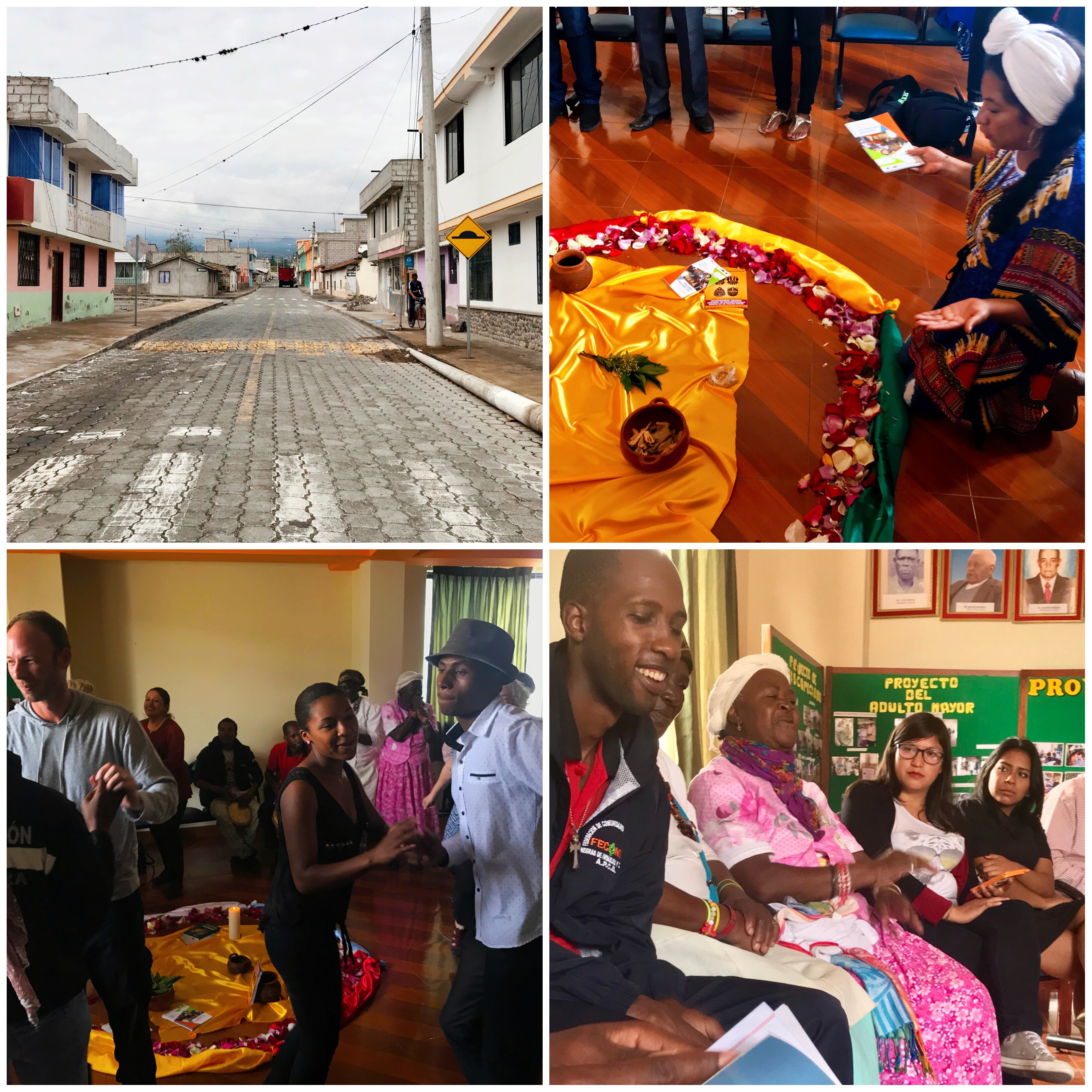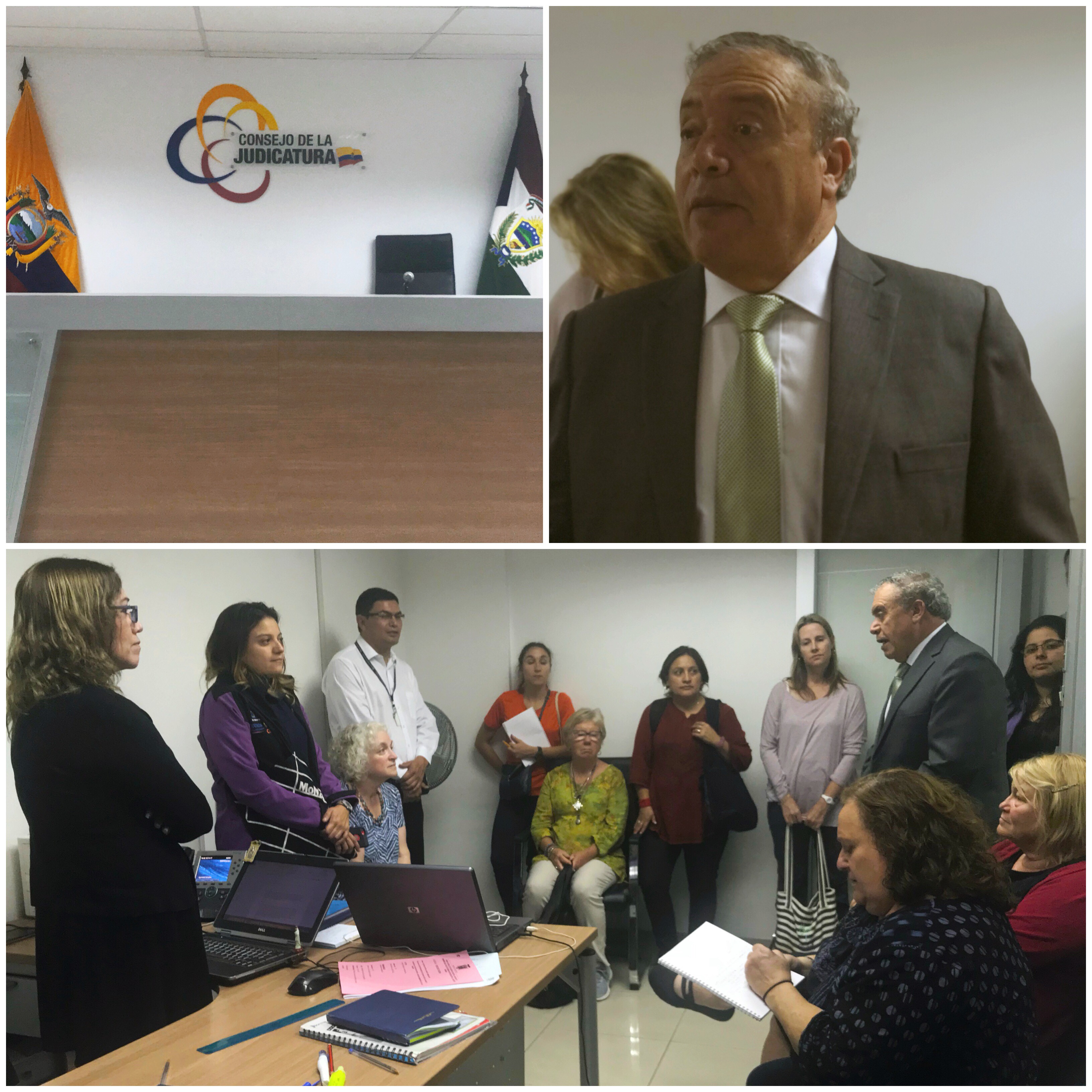Breakfast at Hosteria PANTAVI was like having scrambled eggs inside New York’s MoMA. Art was splattered across the walls, each painting brighter than the next. The group couldn’t peel their eyes from the dancing girls, ancient warriors, Ecuadorian landscapes and the intricate dolls woven from handspun yarn. Several of the CARE Ecuador volunteers purchased paintings and had them shipped back to the U.S. to fill the walls in their homes. Sadly, my NYC one-bedroom can’t accommodate much, but I did take a card in the event that one day I become a property owner.

It wasn’t easy, but our CARE Ecuador lead, Matt, was finally able to corral us into the van for our morning excursion to Ecuador’s ancestral territory. The drive to Salinas was filled with colorful scenery – local crops growing in rows, bundles of roses budded to perfection, pigs and cows on leashes, and locals walking to and fro. When we arrived in town it almost felt as though it was abandoned. The streets were entirely clear and there was not a single person in sight. The mountains in the distance seemed to sparkle with the morning fog descending upon town.
The CARE Ecuador team was escorted into a concrete building and up a steep staircase. Inside the small white room, there was a stunning piece of yellow silk in the center of the floor, with various wooden bowls and candles hunkered on top. To our surprise, we saw nearly 15 faces looking up at us and welcoming us into their community – “Hola,” “Como esta?” and “Mucho gustos” were exchanged. It was hard to ignore the energy and good vibes exuding from this group – their smiles and hugs seemed to make the world more whole. Even harder to ignore, were the two elderly women sitting on the right side of the room. Both were adorned in traditional Afro-Ecuadorian garb, complete with beautiful head wraps and colorful jewelry.
We opened the meeting – which was focused on stories from the field and opportunities for preventing gender-based violence – with an Afro-Ecuadorian ceremony. Gathering in a tight circle, a young woman approached the silk cloth, knelt down, and began to mix various ingredients and herbs to bless the meeting. She chanted and danced as she sprinkled us with water as we clapped and moved to her beat. Halfway through, a young man stood up and started rap/chanting to the temp of the drums that were being played in the back of the room – together our teams embraced the day and the discussion that was to follow.
Many of the Salinas community members shared their stories of gender-based violence and the work that is being done to eradicate the violence in the ancestral territories. The complicated thing about the ancestral territory, is that it is considered to be autonomous. In other words, these communities have been struggling from the very beginning when it comes to the law applying to their needs and their rights. Women and children have zero access to clean water in the territory, it’s hard to get the same education as those in Quito or a major city, jobs are hard to come by, and violence is often far worse in this territory. Additionally, this area has a huge amount of young pregnancies – we’re talking 12 and 13 year old girls. These pregnancies are often a result of rape, after which, these young girls are forced into marriage with their aggressor (marriage is still legal starting at 12 years old). This news was absolutely devastating. While there are some laws in place to protect women and children from abuse in the ancestral territories like Salinas, the stories that we heard earlier in the week ring true in that the laws simply aren’t enforced.
So, how is CARE’s work impacting Salinas? It has contributed to the creation of a solid network of people – men and women both young and old – who are dedicated to changing the norm. They want to see a happier and healthier life for women and girls. They are adamant about equal education and affording women the opportunity to be independent by making their own money and holding their own jobs. CARE has been a huge help in starting this movement, activating these individuals and uniting them with a common purpose and goal. Together, Salinas has created a few educational books that educate women on their rights and what gender-based violence means, and they’ve also worked to pen a book that focuses on the law and the ordinances that will hopefully/eventually breathe new life into how women and children are protected in the future.
When you boil it down – as the women of Salinas so kindly did – they need access to clean water, education, jobs, and land that they can own without the support of a man. We paused the discussion for something that can only be described as an Afro-Ecuadorian dance party, where the two elderly ladies (sisters known as Las Tres Marias) stood up and started signing their hearts out. We danced, laughed, clapped and chanted, before settling back into our seats.
We ended the meeting with a Q&A session, where one of the women from Salinas asked us why we were invested in this cause? She assumed we had never experienced gender-based violence ourselves, and was curious as to why we were all passionate about helping women that are so far away from our own homes. This part got emotional. A woman in our group took the first pass, and started sharing the heartbreaking story that she too was a victim of violence from her husband. Tears were shed and looks of understanding, pain, and support colored the room. Key takeaway: no matter where we live, whether we are rich or poor, no matter the color of our skin or our religion – it’s clear that as women, we all understand discrimination and abuse, and together we want to make a difference.

From Salinas, we made our way by van to lunch where we discussed our meeting with the incredible women of the ancestral territories. After roughly four or five courses of Ecuadorian fare, we were on to the next stop! This time, a meeting with the judicial and legal leaders in Ibarra, Ecuador.
Since arriving in Ecuador, much of our conversation focused on the ordinance that has been put forward for decision on November 25, 2017. Now, we were presented with an opportunity to better understand what this addition could mean to the women and children of Ecuador. It also afforded us the chance to better understand the legal process for victims who are in search of help.
Weaving our way in and out of the beautiful Consejo de la Judicatura de Ibarra was an incredible experience. We met with several of the psychologists, physicians, clerks, and the head/President, Jamie Cadena. We also had the opportunity to better understand which gender-based violence cases are deemed “Family” and which are deemed “Criminal” and what the punishments are for both. In circumstances that don’t include physical abuse, the aggressor can receive up to 30 days of punishment, while the stakes for those involved in criminal/physical abuse are much higher.
While the law isn’t always enforced in Ecuador, it was nice to meet with the faces of the men and women who are trying to make a difference in these women’s lives. We saw a few of the children doing puzzles in the “safe space,” where they’re taken when their mothers report violence, we saw the rooms where the psychological and physical exams take place, we were given the opportunity to sit in the room where interviews take place before a woman testifies, and we had the opportunity to sit in the courtroom where critical decisions are made. This made it real, and for that I/the team was very grateful. There is work to be done, but it is clear that several people are trying and change is in motion.
The greatest takeaway from our visit to Ibarra was the output that CARE has had for those working with the justice department(s). They’ve created an entire pamphlet that fits into a pocket or phone case, that details what gender-based violence is, the various types, who to call and where to go if you’re in trouble, and more importantly, it has served as an education tool for many in need. Beyond that, they are funding a pilot project that sends members of the justice system to the Northern coast, to the ancestral territories, to the remote regions of Ecuador – to follow up with the women who have filed reports and have been abused. This is the first ever for Ecuador! This pilot project has the potential to ensure the law is being enforced and in turn, keeps more women and children safe when before their cries may have gone unanswered.

Simply incredible Maggie – the machismo culture of most of Latin America is very difficult to change, but it sounds like CARE is trying to definitely make a difference. Good on you and those involved in such a wonderful project honey – love Dad and Rita (G’ma) Anderson. Can’t wait to see you over Thanksgiving !